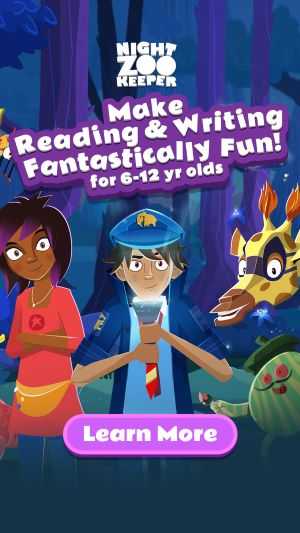Grade 1 Reading
Discover Grade 1 Reading Standards
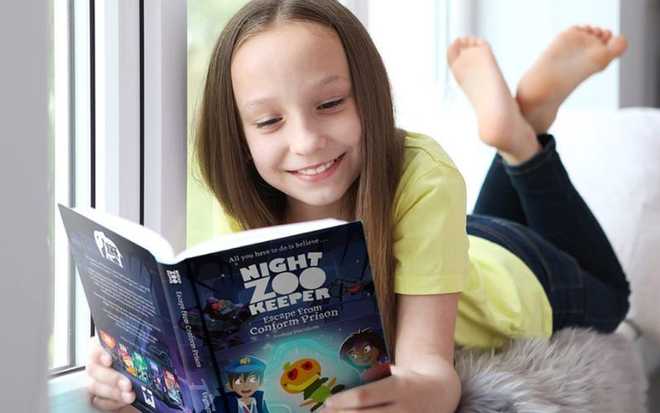
Home > Language Arts > Reading > Grade 1
One of the most important language arts skills for children to learn in first grade is how to read confidently and fluently. As a parent, it can be overwhelming to break down such a significant skill into manageable, teachable chunks. To help you, we’ve compiled the below list of elementary reading skills that your children will need to develop in first grade. This guide also provides examples of reading activities that you can do to develop these skills.
There are two key reading skills to tackle in first grade:
Word Reading
Recognizing that letters on the page represent sounds that can be put together to make words is the key principle of phonics and early reading. In first grade, there are several elements to this that young readers will learn and develop throughout the year.
Features of a sentence
First graders need to be able to recognize the features of a sentence. The first word of a sentence begins with a capital letter and a sentence ends with end punctuation: period, question mark, or exclamation point.
Practice Tip
Play Waterfall Word Jumble on Night Zookeeper to improve your child’s sentence structure knowledge!
Sounds within words
First graders will practice their ability to hear, recognize, and manipulate the sounds within words, which will inherently improve their general comprehension skills. The following skills are all phonological awareness objectives for your young reader’s grade level.
1. HEARING the long and short vowel sounds in spoken words and being able to distinguish between the two.
long a sound - cake
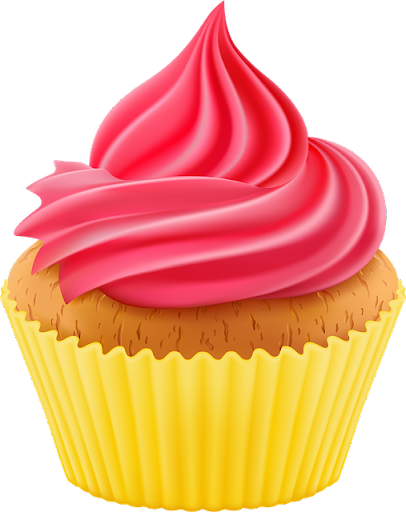
short a sound - cat
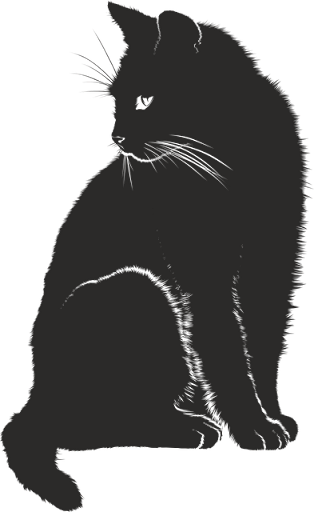
2. BLENDING sounds to form single-syllable words.
/c/ /a/ /t/ ⇨ cat
3. ISOLATING the initial, medial, and end sounds in single-syllable words. This involves a child hearing a word and then identifying sounds according to their position within the word.
- What is the first sound you hear in the word cat? /c/
- What is the middle sound you hear in the word cat? /a/
- What is the final sound you hear in the word cat? /t/
4. SEGMENTING single-syllable words into individual sounds.
- The name Sam can be segmented into the sounds /s/ /a/ /m/.
Practice Tip
Ask your early reader to select a word from Dolch sight word list and then read it aloud to them. Now ask them to work through the four concepts (HEARING, BLENDING, ISOLATING, SEGMENTING) focusing on the chosen word.
Phonics
In first grade, young readers will learn the sound and spelling for common consonant digraphs, such as those listed here.
- ch
- sh
- th
- ph
- wh
They will use their knowledge of phonics to decode single-syllable words similar to these examples.
- pit
- nap
- Tim
- did
- gap
- pot
Children will learn the different vowel teams that represent long vowel sounds. The words below all have different spellings of the long a sound.
- cake
- train
- day
- eight
- great
In first grade, learners will be taught to identify syllables. Understanding syllables can help children to decode longer words, such as pocket and sunset which have two syllables.
They will also be taught to read words with inflectional endings and to read common irregularly spelled words.
Inflectional endings:
- s | trees
- es | boxes
- ing | running
- ed | cooked
Practice Tip
Ask your early reader to identify inflectional endings to words when reading sentences or short paragraphs. The lesson pictured below on Night Zookeeper asks children to read a short text and click on all the words that end with -ing.
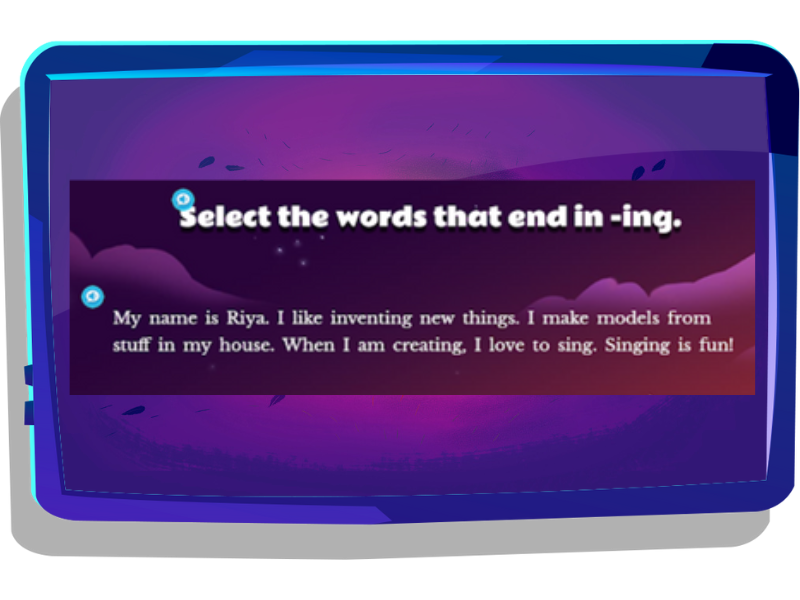
Fluency
First graders should read a grade-appropriate text fluently to improve reading comprehension skills. Once they are able to read words confidently, your child will be able to move on to the higher level skill of understanding what words mean within sentences and paragraphs.
Here are 5 things you can do to help your child practice reading:
- Read first grade books to your child and model what a fluent reader sounds like.
- Ask your child to read simple sentences aloud and then repeat them 3 more times.
- Promote daily reading time. Challenge your child to read for 30-minutes per day.
- Use a ruler on the page to focus your child’s attention to one line of text.
- Practice sight words regularly until they are able to recognize them instantly.
Reading Comprehension
Children will read both narrative and informative texts at this grade level. They will practice asking and answering questions about a given text to demonstrate reading comprehension. This may include comprehension questions about describing characters and settings within a story, or describing the connection between two pieces of information. They’ll practice retelling short stories in their own words and try to identify key details. Where appropriate they will compare texts on the same topic, identifying similarities and differences.
Practice Tip
Cover up a word in a sentence and ask your child to guess what the missing word is based on the context. The Penguin Paragraphs challenge on Night Zookeeper can help students develop their reading comprehension skills. In this challenge children need to read and comprehend the text to identify where the missing words should be placed.
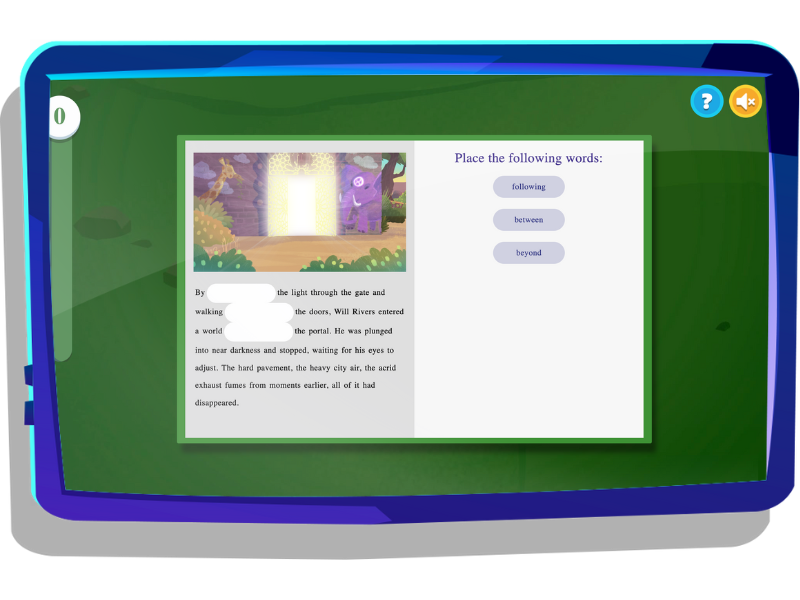
How Night Zookeeper can help

Night Zookeeper is a language arts program that focuses on helping children develop their skills in a fantastically fun way! Improve your child’s reading skills with our award-winning content, which includes reading activities such as comprehension quiz questions and interactive lesson series. We also offer audio support for young readers so they can hear words and sentences read aloud as they follow along.
Sign up to our program today to get a free 7-day trial!
Related articles


Make Reading & Writing Fantastically Fun!
- Award-winning reading & writing program for kids
- Improves spelling, grammar, punctuation & vocabulary
- Over 1,000 different learning games and activities



